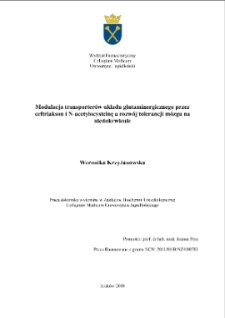Obiekt
Tytuł: Modulation of glutamate transporters through ceftriaxone and N-acetylcysteine and development of brain tolerance to ischemia
Abstrakt:
Stroke is one of the main causes of death, permanent disability and lack of independence among adults. Brain preconditioning is an intriguing phenomenon of the development of brain tolerance to ischemia Glutamate excitotoxicity plays a key role in ischemic stroke, thus two glutamate transporters: GLT-1 and xc- seem to be important in the development of ischemic tolerance. Pharmacological modulation of GLT-1 and xc- expression has been already demonstrated.The purpose of the study was to assess the effect of ceftriaxone (CEF) and N-acetylcysteine (NAC) on the expression of GLT-1 and xc- and to determine whether this modulation is accompanied by the development of brain tolerance to ischemia. The results were related to two reference preconditioning strategies - short-term ischemia (IP) and chemical preconditioning, by administration of 3-nitropropionic acid (3NP).Administration of CEF and NAC as well as application of reference preconditioing factors: IP and 3NP, prior to ischemia significantly reduced the infarct size and the level of neurological deficit induced by 90-minute brain ischemia. These changes were accompanied by modulation of the expression of GLT-1 and xc- transporters at the mRNA and protein levels in the frontal cortex, hippocampus and dorsal striatum of rats subjected to 90-minute cerebral ischemia. In addition preconditionng strategies: CEF, NAC, IP and 3 NP r ; educed glutamate concentrations in the frontal cortex and hippocampus during the 90-minute ischemia.The obtained results suggest that the regulation of GLT-1 I xc- plays an important role in the development of brain tolerance to ischemia.
Miejsce wydania:
Stopień studiów:
Dyscyplina:
biochemia ; farmakologia ; neurologia
Instytucja nadająca tytuł:
Promotor:
Data wydania:
Identyfikator:
Sygnatura:
Język:
Prawa dostępu:
Kolekcje, do których przypisany jest obiekt:
Data ostatniej modyfikacji:
13 mar 2023
Data dodania obiektu:
22 kwi 2021
Liczba wyświetleń treści obiektu:
5
Liczba wyświetleń treści obiektu w formacie PDF
0
Wszystkie dostępne wersje tego obiektu:
http://dl.cm-uj.krakow.pl:8080/publication/4422
Wyświetl opis w formacie RDF:
Wyświetl opis w formacie OAI-PMH:
| Nazwa wydania | Data |
|---|---|
| ZB-130128 | 13 mar 2023 |
Obiekty
Podobne
Krzyżanowska, Weronika
Biernacka-Fijałkowska, Barbara
Górny, Magdalena
Dąbrowska, Monika
Grzywna, Ewelina
Matyja-Bednarczyk, Aleksandra
Niedzielska-Andres, Ewa

